|
|
|
|
|
 DME
2003
DME
2003
(Israel) |
|
|
|
|
|
|
Fall
2006

Progression
Magazine
(USA)
by
John Colinge, Editor
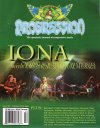
Three,
The Hard Way
New
York's TriPod stubbornly clings to a proud progressive ethic.
It's
like the childhood slogan, "Look mom - no hands!" Only
with a progressive rock spin: "Look folks - no guitars or keyboards!"
Such is the unique rallying cry of New York band, TriPod.
So what do they play, and what do they sound like? TriPod - once dubbed "that 21st century schizoid power trio from the
Big Apple" - is Clint Bahr on bass and vocals, Steve Romano
on drums and percussion, and Keith Gurland on saxophones, clarinet,
flute and electronic effects. Stylistically they cover a lot of
ground, but "progressive rock jazz-jam funk metal fusion"
points you in the right general direction.
Above
all else, TriPod
is an audacious rock band with a passionate perspective on life
as well as music. The trio is very "activist oriented,"
very political, posting links on its website to numerous charitable
causes - breast cancer research, various environmental benefit groups,
child health, world hunger, animal rescue and welfare, literacy,
Native American rights, etc. In the late 1960s when music and social
activism went hand in hand, TriPod
would have felt right at home.
These
days, however, being a politically charged progressive band in New
York City is as challenging as it gets. "Really
bad clubs, and bad bands, playing bad music" is how
Romano assesses the current music climate
in one of the world's great cultural meccas.
"Quite
frankly, it is pretty dismal," Bahr concurs.
"Only when touring acts come through
town will you see talent and inspiration. I would say TriPod's
music is completely unrelated to the current music scene here, which
is actually a good thing."
Many
of the clubs where TriPod
used to play are gone - Wetlands, CBGB's, etc. "Most
clubs that have bands do so not through any love of music or desire
to present it properly, but rather to scam as many people as possible
on any given night," notes Gurland,
who is not given to mincing words. "And
it's a buyer's market for bands willing to be scammed. We exist
despite this climate, not because of it."
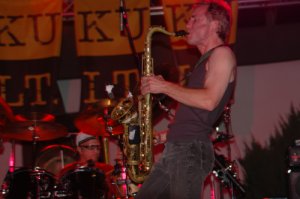
Consequently,
TriPod
has cast a wider net in search of receptive audiences. The band
was a hit at the annual Baja Prog Festival in 2005, and this summer
toured Europe, including appearances at the prestigious Zappanale
and Burg Hertzberg festivals in Germany.
TriPod
has one album to its credit, an eponymous debut released as a promotional
demo released in 2003 on MoonJune Records and reissued with new
artwork this year. A live DVD is forthcoming late this year including
footage from Baja Prog '05 plus shows in Boston, New York and Europe,
along with interviews and behind-the-scenes rehearsal bits.
The
band's roots date back to the late 1990s and a chance meeting in
New York's Riverside Park, referred to by Gurland
as "my open-air practice space."
That is where he and Bahr first came together.
"Upon
hearing the faint sounds of a saxophone, I was led to a sole figure
practicing in the park. I made myself known and invited him to a
session. That "someone" happened to be Keith," Bahr
recalls.
Says
Gurland, "After determining that he meant
no harm, I agreed to a session at his Brooklyn rehearsal space.
This studio - sadly, now part of a mattress factory - I don't think
they have a plaque on the wall or anything) became the laboratory
where we grew this beast we call The 'Pod."
Gurland
sat in on a jam/improv session that included Bahr,
a guitarist, and original TriPod
drummer Billy Ficca. They played, chatted, and Gurland
eventually suggested to Bahr that a bass-drums-sax
trio would be fun to explore.
"Well
we did, and haven't looked back since," says
Bahr. "That was the moment we became TriPod."
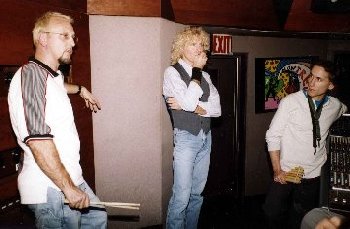
The
band played club dates in and around Manhattan, later renting time
at the famed CBGB's club one afternoon to record a live three-song
demo disc. Between takes a woman approached the stage and asked
if they were signed to a label. The woman was rock veteran Genya
Ravan, perhaps best known as singer for 70s rock band Ten
Wheel Drive. She ended up producing TriPod's
first recorded work.
Ficca
was replaced, and for a time the only constant was an ever changing
roster of drummers. Ex-Gong drummer Pierre Moerlen
joined briefly; he was planning a move from Europe to New York,
but never made the transition. "I still
have music that we wrote together and exchanged via e-mail,"
says Bahr. "So we ended up auditioning
over 50 people, finally finding the illustrious Steve Romano."
"We
found our third leg, so to speak, in Steve," Gurland says.
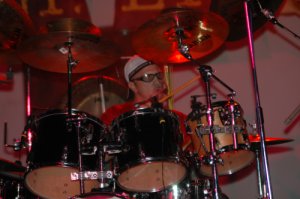
As
noted earlier, TriPod
is a rock band first and foremost - a rock band whose raw power
and energy might be considered rare for a progressive act.
"Our
"style" is a collection of experiences - musical, personal
and social," Bahr says.
"It is something that is organic, not
forced or contrived. I feel it's an honest extension of our personalities
through song."
Gurland
is a focal point of the band's live performances, stalking the stage
and wailing away on sax with wild abandon. Bahr also commands ample
spotlight time with his athletic bass work and expressive vocals.
TriPod
pours a lot of energy into its shows. With only three players, extra
effort is required to project with power while maintaining a technically
demanding progressive edge.
So
what makes TriPod"progressive",
says Gurland, "We exercise freedom; freedom
to change tempo, meter, key, dynamics, whatever. As long as nobody's
trying to do the foxtrot, that freedom is there, and progressive
bands aren't afraid to use it."
"Everything
we do is anything but mainstream," says
Romano. "Right there, it's progressive. The obvious odd time
changes, musicianship, instrumentation, and experimentation helps
as well."
In
Bahr's estimation much of it boils
down to denying conformity, no matter how tempting it might be to
round off some of those proggy edges for wider audiences. "I
would say by not compromising for the sake of being popular, but
by pleasing ourselves with the music first," he says.
"That's what makes us progressive. And if people enjoy it,
then we've done our job."
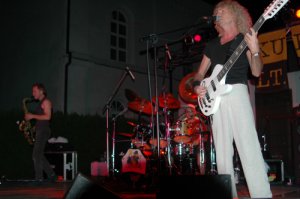
Of
course, the band's unique instrumentation would seem to automatically
place TriPod
in the progressive camp once it becomes obvious they're not a jazz
combo. People still have a difficult time understanding how the
band can muster such a full sound without guitars and keyboards;
as Bahr points out, "It's
all in the way you approach and orchestrate it."
"None
of us are "anti" those instruments at all,"
he says. "In fact, I play and compose
on guitar and keys, it's just that we choose not to incorporate
them into TriPod.
But I will stress that those and many other instruments will be
on future recordings, and played by the band."
The
band's liberal use of electronic effects certainly expands its sound,
lending harmonic breadth. Gurland takes
the musical concept further: "There's
a common misconception about "rhythm" parts, that you
have always to spell out whatever the chord is at any given time.
When Clint plays a G on his 12-string bass, that's three G's. I
think we all get the idea "G" without six other G's coming
in from other quarters. Play melodic ideas and the harmony is implied.
You don't need a wall of sound clogging up the midrange, smothering
overtones and stifling harmonic freedom."
The
word "freedom," the concept of freedom, continually course
their way through TriPod's
dialogue: Freedom of expression as progressive musicians…Freedom
from the tyranny of popular culture…Freedom as Americans and
all it entails.
The
latter hit home, literally, in a significant way five years ago.
As residents of New York City, the 9/11 terrorist attack and subsequent
events affected Bahr, Romano and Gurland personally, and has filtered
down to their music.

Romano
says
it caused him to write "with a little
more attitude" and bring "anarchistic
elements to the table." Says Gurland,
"I'll forever carry the memory of that burning smell in my
nostrils. Doesn't make me want to sing about pixies and flowers,
if you catch my drift."
Which
brings us, naturally, to the band's politics and Bahr's role as
lyricist. Gurland stresses that TriPod's
collective world view is "progressive"
just like the music, but that the trio takes pains to avoid
using the stage as a bully pulpit.
Bahr
explains: "We're not overtly political
as a band, but there is an undercurrent lyrically. In fact, our
next CD release is entitled "Incident", its theme being
the current state of the world."
"I
write the lyrics for
TriPod,
but it's not an easy task for me,"
he says. "I find it much harder than
composing music, it's a real process. But being the singer, I much
prefer singing what comes from my head and heart. If you're lucky
enough to convey anything meaningful to an audience, if you make
that connection, that's a wonderful feeling, be it lyrically or
musically. That's what its all about for me."
Going
forward, the members of TriPod
relish opportunities to play their eclectic music to audiences that
understand what they're doing. They cherish their gig at Baja Prog
2005 as that rare event involving, as Gurland
puts it, "a roomful of happy prog
fans, musical liberals, most of them. These are our people, and
we loved putting on a show for them. We don't play in front of potentially
hostile crowds every two weeks like we used to in the clubs. At
Baja the crowd was anything but hostile."
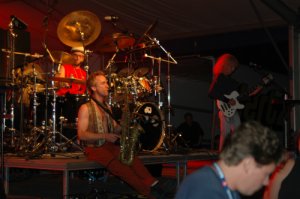
The
shows in Europe this summer were and experiment for the band, its
first ever taste of performing on another continent. Afterward comes
more work on the home front - putting finishing touches on the forthcoming
Incident album, and the DVD.
Beyond
that, expect to hear more from this band on the domestic tour circuit.
"One
of our aspirations is to perform at the Super Bowl halftime show…when
we're 70," Gurland
jokes. "Seriously, we hope to entertain
as many people as possible with our live shows. We also want everyone
to have TriPod
in their iPod."
"Apple,
feel free to contact us!"
June
2006

Eclipsed
(Germany)
by
Carsten Agthe
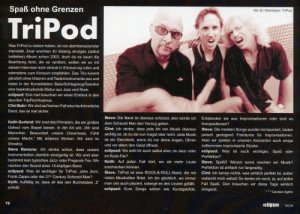
TriPod
offers
listeners breath-robbing intensity. Their CD was produced in 2003,
but since it received barely the attention which it deserved, we want
this interview to call it again to memory and warmly recommend its
purchase. The trio gets along nicely without guitars and keyboards
and has as its configuration bass/percussion/saxophone a formidable
mixturee
of jazz and rock.
Tell
us some things about the band which are not so serious. What is TriPod about?
Clint:
Well, we're not your everyday kind of band, that's for sure!
Keith:
We are three primates who, in answer to a primal directive,
have taken up the tools at their disposal to raise a great howl,
casting unto the void a cry: "We are men. Admire our cleverness.
Feel our might." So, in other words, show biz.
Steve: I would think that the
instrumentation that we use is unique. We are certainly not a typical
jazz trio or prog rock trio. But we push out a sound that is as
large as a 15 piece band.
What's
more important for the band - John Zorn, Frank Zappa or
the 21st Century Schizoid man?
Keith: Note that all contain the letter "Z". Hmmm.
Steve: Well, the band is a
very Schizoid band, so I'd have to say Schizoid man!
Clint: I like to think every
kind of music is important, (whether you like it or not). Every
music has something to offer, if you keep your eyes, ears and
mind open.
Do
you find yourself more in the Jazz or more in the Rock vein?
Keith: Whatever frightens fewer people away.
Steve: I think we have a good
blend of both but we are really a Rock Band.
Your
songs, are they more compositions or more improvisations?
Steve: Most of the songs are composed with some open spaces for a little
improvisation. But we also incorporate entire improvisational
pieces in our live show.
What's
more important - to be perfect or to have a lot of fun?
Steve: Fun!!! Why else would we play?...and perfection is boring.
Clint: I don't know anything
that's "perfect", especially me! So, yes...it's to have
fun. We certainly need it these days.
July
2005

Planet
Bass
(UK)
by
Chris Dale and Matthew Cohen
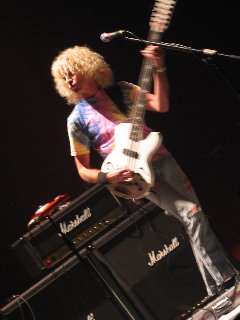
Clint
Bahr
is a very versitile bassist
who
mostly brings his talent to the band TriPod,
a trio consisting of drums, bass and saxophone- no guitarists or keyboard
players here!
What
inspired you to first pick up a bass and what were your first attempts
at playing it like?
The Beatles (like most everyone) inspired me to pick-up a guitar...then
over time I heard those lovely low's of the bass. I also fell for the
look of the Hofner violin bass and Vox amps.
My first attempts were horrid in retrospect...but I joined a band and
never looked back.
Who
were your early influences and what did you learn from them?
Early
influences were Paul McCartney, John Entwistle, Jack Bruce, etc...
the usual suspects. But later that grew to include myriad bassists of
both the rock & jazz worlds.
Did
you take lessons or are you self-taught?
I'm
completely self taught. I learned by listening and playing to records.
I totally recommend that to anyone just starting...along with proper
lessons (if that's your desire). It really helped my ears.
What’s
the most important bit of advice you were given by another musician?
To
be honest, I can't think of anything. But there's always been support
with warmth & encouragement from my friends, family and mentors.
That's really a wonderful thing.
What’s
the most important bit of advice you could give to new bassists?
Be
yourself and listen to every kind of music.
Where
do you stand on the old fingers vs. plectrums debate and why?
No
debate for me, as I use both styles...they've each a lot to offer.
Do
you play 4, 5 or 6 string basses mainly? Fretted or unfretted?
I
play 12-String Bass (fretted). Also 8-String, Chapman Stick, 4-String
etc...
I've played 5-String at sessions but don't feel very comfortable on
them. I've never played a 6-String Bass for professional reasons.
I have played upright bass and fretless electric basses in the past
and I love them.
How
would you define your style of playing?
QUITE
eclectic...I would say.
Tell
us a little about the artists and bands you have worked with, and how/if
you adapted to playing with each of them?
I've
played with pretty much all styles of bands (except Classical)...you
adapt to the situation and make the best of it, have fun.
Of
the artists and bands you've played with who was the most inspirational
and why?
I
would say my current band TriPod...simply
because of the demands on me, there's NO GUITARS or KEYBOARDS
in the trio and I'm also singing & playing bass pedals, etc...it's
quite a tap dance!
Do
you warm up before a concert and if so how?
Yes,
both instrumentally & vocally. On bass it's a lot of whole tone
scales and running through the complex lines, etc...Vocally, it's everything
from relaxed humming to screaming.
Do
you have any other last minute rituals or habits before a concert?
To
loosen the shoulders & neck with a quick massage prior to going
on stage...it helps, due to the weight of the 12-String.
What
do you drink onstage?
Water.
Have
you ever played while drunk or under the influence of drugs?
Yes,
a loooooooog time ago...when it was fab.
What’s
the biggest disaster you’ve ever had onstage, and how did you cope with
it?
I
remember one very important show when my entire sound shut-down. It
was terrible for me (and band), but most of all our intrepid roadie,
who soon fixed the problem. But those times can be the worst...just
grin & bear it.
What’s
the biggest disaster you’ve ever had in the studio, and how did you
cope with it?
Never
had a disaster...but we did have quite a perplexing problem on our last
recording. We used Pro-Tools, and for some reason the vocal tracking
didn't sync with the instrumental tracks properly. Everything was in
A-440...but the lead vocal was tracking at a higher pitch (yet in tune),
finally after a few days a surgeon was called in and found the problem.
He said it was a first in all his experience...I still don't know what
was wrong, but that's electronics for you.
What’s
been your proudest playing moment?
Many...but
most recently playing The Baja International Rock Festival (Mexico).
TriPod received two standing
ovations and an encore...it was a great night for the band.
What’s
been the most fun playing moment, and why?
Most
likely my very first gig...aside from the nerves, it's the beginning
of a new adventure.
What’s
been the least fun playing moment, and why?
Being
fired. Having to deal with out-of-control egos.
What
equipment do you use live and in the studio and why?
I
use a very extensive HiWatt amplifier set-up with Moog Taurus Bass Pedals,
FX pedalboad etc.
Are
you fairly flexible about the equipment you use or must you always play
with the same gear?
I'm
totally flexible...if it's someone else's session.
What
one piece of equipment would you advise all bass players to own?
A
tuner.
No...but
I do read chord charts.
Do
you play any other instruments, and how well?
Guitar,
Keyboards, Mandolin (for composing, recording)...not a vituoso.
Do
you write or co-write songs and if so do you write on the bass?
Yes,
I write & co-write. I'll write on anything that happens to be around...sometimes
it all comes to me without an instrument. Those are the magical moments.
Do
you ever play cover versions, and if so how do you learn the originals
note for note or do you improvise you own parts?
No...unless
it's for fun, at a party for instance.
Do
you sing? Do you feel it is important?
Yes,
I'm the lead vocalist in TriPod
and have been in quite a few other acts. I feel it's incredibly important
to sing, to learn the different levels of harmony is fascinating...but
playing bass and singing is totally contrapuntal and can be hard at
first, but once you get it, you're off...it becomes second nature.
If
you could nominate one song that you’ve recorded to sum up your playing
style and feel which one would it be?
"Dance
of the Kabuki" on TriPod's
most recent CD...MP3 are on our website.
What
have you been doing recently?
We've
been on the road, currently rehearsing & writing new material.
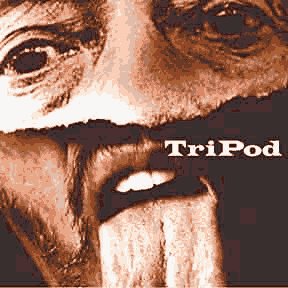
January 2004
Radionotte

(Italy)
Are
you completely satisfied with this CD?
Steve
- Yes, I think it turned out great. It's a good representation of what
we sound like.
Keith - Satisfied, yes, but never
completely.
Clint
- In retrospect there are always little things you wish you could
have done better or differently.
What
are the most important inspirations for doing this new album?
Clint
- Keith & Steve
are my inspirations on this album....they are simply two of the finest
musicians I've ever worked with. Also, our producer Ron Allaire was
an inspiration and he did a wonderful job.
Keith - We tried to make a cohesive
statement as opposed to a collection of songs.
Steve - It's a culmination of
our efforts as a collective unit, and as individual musicians. We
finally found a project that lets us express our ideas, emotions and
musicianship.
Are there some others artists that you think would be important to
recommend to us?
Steve
- Too many to mention.
Clint - Nobody that you aren't
already familiar with.
Keith - Our points of reference
tend not to be too recent; better to go directly to the source than
get it secondhand and watered down.
Are there some others projects in your future?
Keith
- We've got lots of ideas. We're ready to record our third album.
Skip the second and just move right on to the third.
Clint - We've got some tracks
leftover from our recording session that will be used on the next
CD release, plus a plethora of new material. We look to keep our formula
the same, yet change from record to record.
Steve - I don't know what's in
the future, right now TriPod
is all I have time for.
Is there something in your album that you're not satisfied with?
Clint - No......I'm quite happy
with the outcome.
Steve - THE COVER!!!!
Keith - The cover could stand
revision. Also, bars 124-127 of track 12 are somewhat problematic.
Clint - I also want to say thank
you Gabrielle for your very kind words and support concerning TriPod....Cheers
from NYC!
Keith - Long life to TriPod!!!
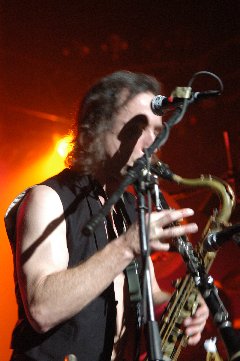
November 2003
Hairless
Heart Herald

(UK)
by
Jem Jedrzejewski
When
we reviewed TriPod’s
album back in September 2003, we were itching to delve a little further
into the background of the unique music Clint
Bahr, Steve Romano and Keith
Gurland purvey. Too late to get tickets on Concorde’s
last flight to New York to meet the guys, we persuaded them to break
with tradition and use keyboards (computer keyboards that is) to ‘speak’
to The Hairless Heart Herald…
Warning:
This article, like all others on this site is © The Hairless
Heart Herald 2003 and must not be reproduced in any form without
our express permission (and/or an obscene amount of money).
I'm
sure you have been asked this many times before but just how conscious
was the decision not to make use of guitar or keyboards?
Keith:
Or accordions or banjos, for that matter.
Steve:
As I understand it, they tried a guitarist and felt no need for it.
The style of the bass and sax left only room for percussion.
Clint:
It wasn't a conscious decision at first. We started sessions
in the very beginning with a guitarist, but I remember
Keith suggesting it as a trio.
Keith:
We decided to remain a trio because we're more manoeuvrable that way;
better able to hear one another and to really play together.
Clint:
So from that moment on, "TriPod
was on track and we haven't looked back"!
So
was it a deliberate attempt to conjure up something completely new
in the world of progressive rock and fusion, by using wind instruments
in place of strings (Chapman Stick excepted)?
Steve:
No ...it just happened that way.
Clint:
No, it wasn't deliberate to use woodwinds, Keith just happens to play
all those instruments.
Keith:
It's something I had always felt would work. You need strings,
Clint has 12 of them on his bass.
Clint:
The whole formation of TriPod
came about by chance and in a very organic nature. One afternoon my
wife and I took a walk in New York's Riverside Park and I happened
to hear this fabulous horn playing, so I introduced myself and the
rest is history. You
know when someone's a good musician within the first few seconds and
both Keith & Steve
were apparent immediately.
Steve::
It jelled the moment we started jamming (as a three piece). We make
enough noise by ourselves!
I
would imagine that it is not easy performing your music live, especially
considering that there are only three in the band. How do you go about
it?
Steve:
Actually it's better live than in the studio! All we need is our equipment
and we're ready to go!
Clint:
TriPod
is a LIVE band and is at its best on stage. There's no problem whatsoever
in re-creating our sound in concert, in fact it's better!
All our music is written and arranged with performance in mind, and
amongst the three of us is quite an array of sonic options to choose
from.
But I must say we are VERY busy when we play………no slacker's
in TriPod!
Keith:
It's an athletic event - the TriPod
-athalon.
When
it comes to composing, do you individually come up with ideas and
develop it by means of jam sessions or is it more a case of one of
you presenting the 'finished' work to the others? And do you make
use of keyboards at the composing stage?
Clint:
A little bit of both really.
Steve:
Composing comes in many forms, some jams, some pre-written. But whenever
a tune is brought into the band, it takes on a new life. Each member
brings his unique personality to the song. I personally compose on
electronics (drums, mallets, computer).
Keith:
Basically, someone brings a piece to the band and the other
two guys twist it beyond recognition. It becomes TriPod
-ized. Some of the material might be composed on a guitar or piano
initially, but we don't present it to one another that way
Clint:
Normally a song is brought in with a somewhat completed
format and goes through the arranging process until we're happy with
it. We all write, so there's no lack of material and we also have
the improvisations/jams. As for what instruments I use for composing,
whatever happens to be around at the moment of inspiration……..
guitar, piano, mellotron, stick, bass etc…have all been used.Also,
there have been many times songs or ideas for songs, lyrics and arrangements
have been composed without instruments at all - in my head.
Will
your next album follow similar lines to the self-titled debut or will
it have a totally different tack, maybe with the introduction of instruments
not used on the first album?
Clint:
TriPod
is a rock band that follows no guidelines, so we could veer off in
any direction.
Steve: The core of this band is bass, drums & sax...that
will always be.....But we do experiment all the time so you never
can tell.
Keith:
We have a few new toys: electronics, effects, theremins... no extra
personnel, though.
Clint:
The Chapman Stick will be used with TriPod.
There's also a considerable amount of music to choose from for the
next album, some of it is already recorded.
When
can we expect the next album and have you got a title for it yet?
Clint:
There are no plans for recording a new album at the moment...........things
are in the process for our current CD to be marketed worldwide and then
we'll tour this music.
Steve: Well,
we need to get this one exposed to the world and tour to support it.
The next album I would hope in about a year.
Keith: At
the moment we have no idea what the next record will be called.
Have
you played any dates in Europe so far and have you any plans to do so
in the near future?
Clint:
TriPod
hasn't toured Europe yet, but we are looking forward to it in the very
near future.......it'll be a gas!
Keith: We'll
be in Europe once the booking and album details are completed.
Steve:
Not yet but we are working on it...we can't wait! We're all ready to
RIP IT UP!
And
we can’t wait either! Many thanks for the informative and entertaining
answers. Until next time…
-Jem
Jedrzejewski
Hairless Heart Hearald
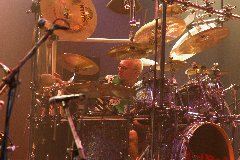
September 2003
Nucleus

(Argentina)
by
Sergio Vilar
"A
World Of Surprises!"
"Welcome
to the new experience of the progressive
yankee.
Welcome to a world of extreme sensations.
TriPod has arrived!
Probably one of the big revelations of the year."
Could
TriPod present
themselves to our readers?
Keith: Yes.
Clint: Hello Nucleus readers.
Greetings from New York City.
Steve: "Yo!" I'm Steve
Romano bred in Brooklyn: drums, acoustic and electronic percussion.
Please, tell me a
little about the album that you have just produced...
Steve:
The new CD is a unique blend of our collective musicianship. It shows
the extreme range and cultural influences of our personalities.
Clint:
It's is a combination of many things…composing, rehearsing, improvising.
I'm very happy with the outcome.
Keith:
It's just the tip of a very big iceberg, but one needs
start somewhere.
How long did it take
you in total the recording?
Clint:
The CD was recorded Spring, 2003 with producer/engineer
Ron Allaire at the board.
Steve:
The recording took about six months because of scheduling, but if
you count only the studio time we could have made it in two months.
The CD has many first takes as well as some jams!
Keith:
A weekend to lay down the basic tracks. Mixing started slow, finished
fast.
Musically, how would you compare
TriPod in
relation to other bands of the style? What is it that is different
from the rest?
Steve:
There is really no comparison. We are unique in our line up, our choice
of music and even our live shows. What you hear on the CD is nothing
compared to us live. We bring a much needed kick in the ass to the
entire music scene.
Keith:
TriPod is about three
distinct personalities combining to create a distinct sound; replace
any one of us and that sound would be totally different.
Clint:
I feel TriPod is a
band that comfortably sits within any genre of music. One thing that
distinguishes TriPod
from the pack is that we're a trio without the usual instrumentation.
How you like other bands? It doesn't care if they are not of the
same style as you...
Keith:
The Beatles were pretty good.
Steve:
All music influences me…..sometimes good, sometimes bad. As for
drummers Weckl, Chambers, Bozzio, Bonham.
Clint:
I love music, all different styles: I really listen to a very diverse
assortment of musics. The list is long.
I should say them that you fear like "Dance
Of The Kabuki", "Fuzz" and "As
The Sun" I found really excellent. Full with
being able to and imagination. Do you consider that they are these
the topics that better they represent your music?
Clint:
Thank you Sergio.
Keith:
Absolutely.
Clint:
Yes, we're very happy with those songs. "Fuzz"
is a studio improvisation, a total off the cuff live recording. We
went in and just played. No conversation, just played. By the way,
"Ghosts" and "Smoke & Mirrors"
are also live studio improvs.
Steve:
We are not the type of band to get locked into doing a certain kind
or style of music. (Personally, I would get too bored.) Our mood,
feelings, surroundings, and political state will convey our emotional
response within our music.
Which is the thematic one that you approach in your lyrics?
Clint:
Writing music is very easy for me, BUT to write a melody
you hope someone can whistle or a lyric they might relate to is a
whole different story.
Keith:
Good lyrics leave something to the imagination. Something for the
listener to interpret subjectively.
Clint:
It might be a train of thought, an expression, something I read, something
I saw on TV, witnessed or heard in the street that sparks my lyrics.
You know New York City is full of so many cultures and dialects. It's
very inspirational and can be quite humorous as well.
With
the disk already published, now the moment of the release comes.
How do you get ready for this stage?
Keith:
We need good folks like you to help spread the word.
Clint:
TriPod is
ready to take its music on tour internationally. Things are in process
for touring as we speak. We look forward to going to Argentina to
meet the people and share your culture. That will be great.
Steve:
We are ready for the stage!....We are caged animals awaiting the feast!
Which are your plans for the rest of the year? Will there be a lot
of activity in relation to the shows?
Clint:
Yes. Lots of activity.
Keith:
The whole point of this enterprise is to play to as many people as
we can. So, yes. Watch the Web site.
How today is the progressive scene in New York? Are there interesting
proposals among the new bands?
Steve:
If you pay attention you can find some great music and musicians.
The music scene in NY is quite large…but as I have said before,
there are a lot of bad bands, in bad clubs, playing bad music.
Clint:
NYC doesn't have much of a "prog" scene, or any scene per
se. It's a market for touring acts.
Steve:
What "prog" scene?
Keith:
New York has more bands than it has an audience for. It is hard to
be heard above the din.
Thank you. Do you
have some final message?
Keith:
The music is the message (Whoa!).
Clint-
Thank you, Sergio, and best of luck with this magazine. It's
been a pleasure to speak with you and your readers. Cheers from NYC.
Steve:
Please check the website for updates - and support independent music.
www.TriPod-theband.com
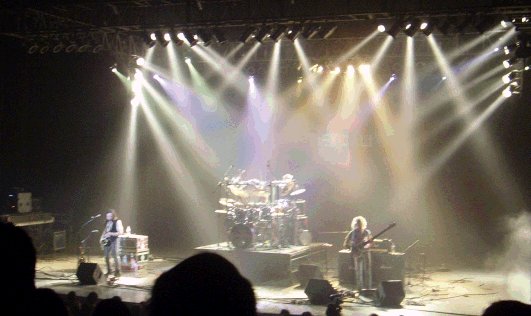
September 2003
DME

(Israel)
by
Dmitry Epstein
"Rarely
is a new band exciting and enticing enough to incite an interest
and a desire to ask the musicians some questions. Yet, TriPod's
music does raise questions, and the release of the New York
trio's debut album gives a good opportunity to tickle bassist
Clint Bahr, reedsman Keith
Gurland and percussonist Steve
Romano". a
Do
you consider
TriPod's work experimental or everything's
planned and accounted for?
Clint: TriPod's
music is a little bit of both elements. We like to keep as many doors
open to creativity as possible.
Keith: There is room in all of
our songs for improvisation. That is the spirit in which we like to
play, to allow for surprise.
Steve: We experiment all the time
when we rehearse. As for in the studio, we go in with structured well
planned songs. We also leave some room for total improvisational jams.
Most times the outcome is surprising.
Where
would you place the band on the "rock - fusion" scale?
Keith:
Somewhere around the flatted fifth. We're a rock band.
Clint: TriPod
is a rock band that has the capability of going in any direction it
chooses.
Steve: We
lean toward the rock side!
Clint: We plan a few surprises for
future recordings.
Why
does your music sound so nervous?
Clint:
Nervous???
Steve: Nervous! Don't you mean PSYCHOTIC!
Keith: Some people say we've got
a lot of nerve.
Was
the combination of saxes and heavy riffs inspired by KING CRIMSON?
Keith:
Not a huge influence for me.
Clint:
No. TriPod's music
is not inspired by Crimson, but I must say I have always loved the
band in all its incarnations. They've always had great players.
Steve:
Our inspiration comes from all our collective backgrounds.
Crimson is just one of a million bands, musicians, poets, writers,
artists, etc., that influence us.
Who was your inspiration as a bassist? \
Keith:
Paul Chambers.
Clint:
There are so many Dmitry, that there's not enough room to name them
all.....for me, anyone of substance.
Are
vocals important to the music you do? They seem quite auxiliary, supporting
the melody...
Steve:
Vocals are very important ...they enhance the music and at times are
the driving melody.
Clint: Yes, vocals are very important
to our music, it's the human connection. They are not "auxillary"
in any sense.
Keith: We like to weave voices into
the music so that they share a more or less equal footing with everything
else that's going on - as opposed to having the other instruments take
a backseat.
Is it hard to reproduce your sound live without losing any intensity?
Keith:
On the contrary, it's hard to capture the intensity of our live sound
in the studio.
Steve:
No, not at all...in fact the sound is much grander and you can only
feel the true intensity of the band at out live shows.
Clint: TriPod
is a LIVE band that functions at it's best on stage.
Aknowledgments list of the "TriPod"
album includes the name of Jonathan Mover. What was the contribution
of this renowned drummer?
Steve:
Jon is a friend and we choose his studio to record our album.
Keith:
He lent us a drum set at one point... oh, and he provided us with
a world-class studio in which to record.
Clint:
He co-owns Skyline Studios with our producer/engineer Ron
Allaire.
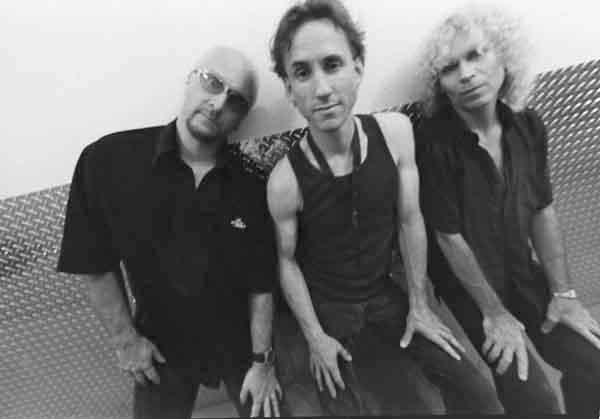
February 2003
Sea
of Tranquility

(USA)
by
Pete Pardo
New
York's very own TriPod,
a band that almost defies classification with their brand of jazz/metal/prog/funk
chops, gets set to release their first official CD after a very
successful demo that had the progressive community taking notice.
Pete Pardo had a chance to catch up with Clint Bahr, Keith
Gurland, and Steve Romano and talk about the many things
that make up this unique trio.
SoT:
Can you give us a
little history on yourselves and the band.
Clint:
I was raised on Cape Cod, Massachusetts and began my musical
career there. I got fed up with the "music scene"
in the States and moved to London, England while still
a teenager. I was fortunate enough to work with some excellent
musicians and play some great gigs. It was quite an education
and many of these people are still good friends of mine.
Keith:
I used to have an open-air practice space in Riverside
Park on Manhattan's Upper West Side. On my final visit
to this space (known as "The Grassy Knoll")
I was approached by Clint
who, instead of requesting money or silence, suggested
we play some music together.
Clint: He was outstanding,
so I introduced myself and the rest is history. Unfortunately,
 had
the "exploding drummer syndrome" for quite a
while. had
the "exploding drummer syndrome" for quite a
while.
Keith: Last year we
auditioned Brooklynite Steve
and, after retrieving our collective jaw from the ground,
demanded that he join the band."
Clint: With Steve
on board, it's a different and finer working music machine.
He's fabulous!
Steve: Well, I'll
leave the band history to Clint
& Keith. As for
me, I was born and raised in Brooklyn and answered the
ad for  after checking out their website. I found their music
to be unlike anything I'd heard before. I then made it
a point to get into the project!
after checking out their website. I found their music
to be unlike anything I'd heard before. I then made it
a point to get into the project!
You can hear lot's of
influences in your music, from progressive rock, to jazz,
and even a little metal. What are some of the bands that
you all grew up on?
Keith:
Metal is a naturally occurring element on
Long Island, where I grew up. In addition to bands like
Yes and Tull, I would go see Blue Oyster
Cult.
Steve:
Zeppelin, Sabbath,
Rush, Yes, ELP, UK, Crimson, Brand X, etc...I would
also follow drummers as they progressed into other bands.
(example: Terry Bozzio)
Clint:
I love most all music styles; there's always something
to be found if you care to delve….BUT the writing
and performance must be up to par. The bands I grew
up listening to would be much too long to list here.
However, The Beatles were, are, and will forever
be the best. They pretty much covered all the musical
bases. Brilliant!
 features
no guitar, but lots of heavy bass riffs and scorching woodwinds.
What made you decide to go with a guitar-less line-up? features
no guitar, but lots of heavy bass riffs and scorching woodwinds.
What made you decide to go with a guitar-less line-up?
Clint:
We first tried improvisation/jam sessions that included
guitar but soon realized the "guitar-less" trio
configuration was stronger.
Keith:
Guitar can muddy up the sonic landscape. Clint's
bass triples every note. How many Gs do you need to hear?
We have the bass pedals should more become necessary.
Steve: After hearing
the Sax with the 12-string Bass there was no need for it.
At times this three piece unit can pump out an orchestral
thickness.
What
are some of the band's favorite songs on the promo CD, and
why?
Steve:
"Trip the Light" because of the
intense groove and Zappa-ish bridge. And I really
dig the new material that we have just recorded.
Keith: Each song aspires
to take you on a journey (or Trip, if you
prefer). There are good versions of "Incident"
and "As the Sun" on there.
Both of those pieces sound quite different now, so we've
re-recorded them.
Clint: "Jerome's
Spotlight", "Incident", "Trip the Light",
and "As The Sun" are among my personal
favorites. These tracks are included on our upcoming official
release.
How is the music scene in New York? Do you get to play live
at all?
Steve:
I'm not a big fan of the music scene in the
NYC area. There are some places to see some great music
and musicians. But they're hard to find. For the most
part, you are bombarded with an onslaught of bad music,
played by bad musicians, in bad clubs.
Keith:
It's a buyer's market
for live rock'n'roll, so nobody pays you and everybody
treats you like crap. So, like Rodney Dangerfield...
Clint:
The music scene is great when you play New York City on
a proper tour in proper venues. But God help you if you're
just starting out. It can be demoralizing for a new band.
What
are the plans for an official CD release? Are you writing
and recording new tunes?
Keith:
We have lots of new material
in the can. We're thinking of taking some of it out of the
can and selling it.
Steve:
Yes! We are in the process of mixing our new CD and continue
to work on new material.
Clint: We have a wealth
of new tunes, some of which are on the new  CD
being produced by Ray Bennett of FLASH. CD
being produced by Ray Bennett of FLASH.
Steve: When we get to touring
we'll have enough material to keep every show fresh. Every show
will be a new experience for the audience.
Clint: And a new audience
for the experience.
Are
there any plans to expand the line-up, or is the future
of the band as the name implies, a trio?
MF:
Hi
Clint and Keith…first of all you've told me that  has recently changed one of its members. Can you introduce the new guy
sitting behind the drums to the audience?
has recently changed one of its members. Can you introduce the new guy
sitting behind the drums to the audience?
Clint
& Keith: Absolutely! Ladies and Gentlemen,
here's our new percussionist, Steve Romano.
(Hooray!)
Steve: Hi! I'm Steve
Romano, a native of Brooklyn N.Y., playing drums, percussion
and electronic drums.
Your band hails from New
York. Can you tell me the pros and cons of living and playing in a big
city like this one?
Clint:
Obviously, these days there are many cons to living in New York City,
but I can't think of one! I love this town.
Keith: The pros are evident in that
we three all found one another here. The cons are many, foremost among
them being expensiveness.
Steve: I guess it is easier to find
musicians to jam with but it's still hard to find the right project.
I don't think I would have found this band living in Kansas (No offense,
Kansas). I personally feel there is not a good music scene in N.Y. There
are no clubs or radio stations willing to put forth the effort to support
underground, experimental or progressive music genres.
Can you recount to
the web surfers how  started?
started?
Keith:
The seeds were sown on a grassy knoll
in Manhattan's Riverside Park, where Clint invaded my al fresco practice
space. And we two began a collaboration that quickly took the form of
 . .
Clint: And
Steve came to us via a posted advertisement. Of over 50 candidates,
he was the one.
I think that your combination
of instruments is unique…do you believe this is really an advantage
in a society that looks way too conventional in my opinion?
Clint: Yes.
Keith:
People who hear us live in concert and on CD remember this band.
Steve: When I first heard  on their website I was blown away by their sound, musicianship and
uniqueness. I think it's all about originality, the ability to create
(as a team) your own type of music. Example: ELP, Rush, Yes,
on their website I was blown away by their sound, musicianship and
uniqueness. I think it's all about originality, the ability to create
(as a team) your own type of music. Example: ELP, Rush, Yes,
 . .
The only band I can
refer to you is Primus, and even this is a farfetched comparison. Is
there a band you would like yourself to be linked to? What are your
influences?
Steve:
Pretty much every thing I hear musically influences me ...some times
good, some times bad, some times really bad. I wouldn't like to be linked
to any other band...We are our own entity, so to speak.
Clint:
My influences are too numerous to mention and very varied. I'd like
to think  is
the musical missing link. is
the musical missing link.
Keith:
You can see our image in Yes, King Crimson, ELP, Frank Zappa.
Now a more technical question.
You use a 12-string bass…why do you prefer it?
Clint:
I've always played chordally on the bass and used multi-string
basses and the Chapman Stick, etc…It's just my nature and it works beautifully
with  .
For more info on this unique instrument see http://www.12stringbass.com. .
For more info on this unique instrument see http://www.12stringbass.com.
Do you think that the
web is the future for music or not?
Steve:
Not the whole future but it will be a big part of music and I embrace
it.
Keith:
The web can introduce a band to an
audience it would otherwise be unable to access. Here we are using it.
You proudly state that TriPod
doesn't include guitars or keyboards. But if you could choose a musician
to fill these spots in an hypothetical expanded Tripod formation, who
would you choose and why?
Clint:
Nobody!
Keith:
John McLaughlin is certainly welcome to sit in. He's succeeded
in so many formats.
Steve:
There are a number of unknown musicians
that I personally know that would work well. But as for persons the
public knows, it would be cats from the 70's like Steve Howe, Eddie
Jobson, the monster players I grew up with.
Are you already working on
the follow-up to your self-titled debut or not?
Steve:
Since I've filled the drum seat we've
been working on all new material.
Keith:
We could record it tomorrow.
Clint:
We have enough material for 3 more
CDs.
Are you searching for a capable label to support
you or you think you'll continue as an independent outlet?
Keith:
Capable is the key word here. Do it right, or we'll do it ourselves.
Clint:
We will always be "independent." And certainly  will find the correct label.
will find the correct label.
Time's up. There is something
else you would like to say to the audience?
Keith:
Ciao.
Steve:
Look for
us! Check our website for updates! We will be in your "hood" (remember
I am from Brooklyn) soon enough and it's gonna be amazing!
www.TriPod-theband.com
So thank you for the sweet
talk. Bye and good luck for the future!
Clint:
Thank you, Igor. Cheers from New York City!
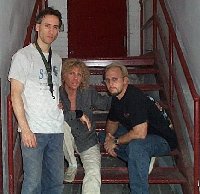 October
2001
October
2001
Eclectic
Magazine

(Hungary)
by
Attila Torok
EM:
How did you get the idea to make rock music without guitars and keyboards?
Clint:
It was Keith's idea to have no guitars. It really opens up the harmonic
possibilities not being tied down to the typical chord progressions.
Keith:
Sax/bass/drums is
a configuration much explored by jazz musicians. If it succeeds in rock
music it does so for the same reasons, i.e., greater freedom afforded
by the absence of oft-redundant chording instrument.
Doesn't it make problems performing
live? Isn't it too thin sounding?
Clint:
It's better live. The sound is HUGE live, not thin at all.
Keith: One
inherent challenge of this trio format is to vary the texture, and if
that texture feels thin in places, we can add notes and different sounds
with our feet (sometimes it's a real tap-dance), always live, always
"real time."
If I know well, you're working
on the new album. Please tell us some words about the forthcoming new
material!
Keith: The
new material is as varied as the old, but we've picked up some new weapons
(Musicvox 12-string basses, Morley effects), so we might sound a little
"meaner."
Clint:
Well, we're in the process of replacing the drummer, but the new music
is really wild and very heavy.
How do you compose your music?
For example who brings the ideas, etc?
Clint:
Both Keith and myself write ALL the music and lyrics.
Keith:
The Bahr/Gurland synergy is responsible for most of it, but everyone
brings in tunes and everyone then messes about with them.
Although
 is
not too old a band, but seeing your photos and hearing your music, I think
that you're not teenagers. What musical past do you have besides is
not too old a band, but seeing your photos and hearing your music, I think
that you're not teenagers. What musical past do you have besides  ? ?
Keith:
Was it the lack of pimples that tipped you off? We've been around the
block a few times with this one and that one, but that isn't who we
are. This is who we are.
Clint:
I've worked in all kinds of musical atmospheres: rock, jazz, folk, etc.
Won't
you be angry, if I tell you that I heard many jazz elements in  's
music? 's
music?
Clint:
Not at all, it's a compliment. People hear a sax and immediately think
jazz, but we're a ROCK trio.
Keith:
Jazz gave us some of our greatest inspiration, we improvise and we swing,
but we're loud and we use a lot of triads, so: in a certain sense a
jazzy bunch of cats, in another sense definitely not.
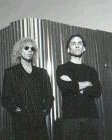
Photo by Alex Solca
EM:
What kind of music do you listen to generally?
Clint:
Everything.
Keith:
No rap, hip-hop, country, ska, rockabilly, disco, house, techno, "smooth
jazz," industrial, trance, drum n' bass or "adult contemporary." Everything
else.
Is there hard or easy to succeed
in New York with this kind of music? Because there are plenty of good
and interesting bands.
Clint:
It's hard whenever you try to do something different.
Keith: New
York doesn't care about its bands, interesting or not. Playing original
music here is not going to pay the ridiculously high rents here.
How do
you see the future of  ?
What would you like to reach with this band? ?
What would you like to reach with this band?
Keith: We
intend to get a label behind us that will give us the initial tour support
that will enable us to establish an international following, which we
plan to cultivate by playing as many shows as we can (more fun than
being in a recording studio).
Clint:
 is
a LIVE band. That is our forte. is
a LIVE band. That is our forte.
Is there any chance to meet
you on a live show somewhere in Europe in the future?
Clint:
Yes. For tour dates please check the official website
https://tripod-theband.com
All tour dates will be posted there.
Keith:
We're coming to your town. We'll help you party it down. We're an American
band.
Finally, please tell us some
parting words for the Eclectic readers!
Clint: We
look forward to meeting you on the road. To get to know us better, our
CD can be purchased: the information is on our website.
All the best and thanks Attila
for a great magazine.
|
|
T12SBP
Interview
Clint
Bahr of

by
Low-End Monster
|
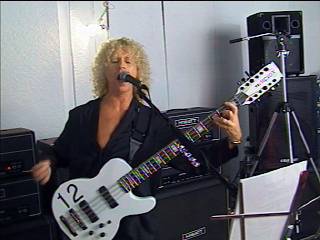 |

Webmaster's
note
This interview was conducted prior
to
 endorsing MusicVox
and Morley.
endorsing MusicVox
and Morley.
MusicVox
President, Matt Eichen, presented
Clint with a
SEA FOAM GREEN Limited Edition MusicVox
12-String Bass.
|
LEM:
Clint
Bahr was kind enough to grant this interview
(via telephone) late December 2000. The versatile 12ver bassist of the
unique band  puts
his 12ver through its paces in an environment it was originally conceived
for. The three-piece band. With no guitar or keyboards in the band,
the 12ver dominates like a T-Rex in the Jurassic period. Nowhere else
is the 12ver more showcased as when it is employed in this fashion.
Clint makes good use of rig and effects
arsenal to push the 12ver to its unexplored and uncharted limits. puts
his 12ver through its paces in an environment it was originally conceived
for. The three-piece band. With no guitar or keyboards in the band,
the 12ver dominates like a T-Rex in the Jurassic period. Nowhere else
is the 12ver more showcased as when it is employed in this fashion.
Clint makes good use of rig and effects
arsenal to push the 12ver to its unexplored and uncharted limits.  is
definitely a great example of prime 12ver territory. is
definitely a great example of prime 12ver territory.
To
learn more about  visit
their site at the
TriPod Homepage. visit
their site at the
TriPod Homepage.
LEM:
What made you decide to get a 12-string bass guitar?
Well
I have been playing multi-string bass guitars for many, many years
starting with the Hagstrom 8-string in the old days. But you couldn’t
really play it above the 5th fret without the intonation going all
crazy on one of those. When Tom Petersson came out with the
12-string, it was a very logical extension to the 8-string format
and, of course, he made it famous. It was a natural evolution for
me to go from the 8- to the 12-string bass.
I
used 8-strings and Chapman Sticks until
March 2000 when I purchased my first 12-string. A Musicvox
Space Cadet. It was a breeze to go from one to the other really.
The body is not too big but the neck is elongated at the stock. I
thought it would come with an option to buy a hardshell case, but
it came with a very good gig bag but it is really not sufficient for
touring with respect to protection. So I will have a case custom made
for it, which is really a pain in the ass. The headstock has a cosmetic
wedge extension on the end/ top of it, which makes the
Space Cadet longer and consequently it does not allow it to
fit in a standard bass case so I will have flight case built for it.
As I visited the  website
I saw the picture of you with your Musicvox Space Cadet 12-string bass.
Is that the only 12ver you own at this time? website
I saw the picture of you with your Musicvox Space Cadet 12-string bass.
Is that the only 12ver you own at this time?
Yes.
I love it. I think the construction of it is fabulous. To be honest
however, I think the electronics and pickups could be a lot hotter.
What I want to do is get a Chandler like yours and Tom’s. I really
like the fact that it has graphite in the neck.
It
wasn’t until I saw the photos of your Royale on T12SBP, that
I found out that the Chandler was available in a mono version. I was
very pleased to learn that. I want to get a mono version because my
bass is already being miked, DI’d and with the sound off the stage
in the mix as well it (the sound) is split up enough. I prefer the
wall of sound as opposed weakening the sound by splitting it up especially
in a band like  (a 3 piece band with no keyboard or guitars) it really needs
to be a solid sound coming off the stage and in the studio too.
(a 3 piece band with no keyboard or guitars) it really needs
to be a solid sound coming off the stage and in the studio too.
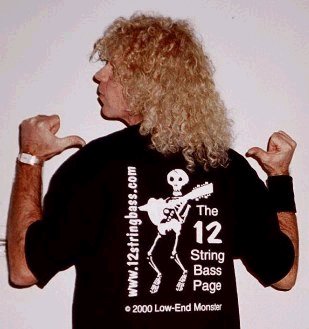
What is your equipment/ rig setup like and how do you process your signal?
I
use a pedal board that encompasses an old Morley
Power Wah Fuzz pedal to an old MXR 10
band EQ to a Bass Whammy pedal
and from there to an original vintage ElectroHarmonix
Bass Synthesizer and old Korg
PME pedal board which has a phaser, a
compressor, analog delay and a
chorus. I always keep the compressor on in order to boost the
highs on the instrument so its really chimey sounding.
From
there it goes into a Boss Bass Overdrive
and a Boss Analog delay and that signal
gets fed into a DI box which is split and goes to the
PA system and the whole Amp system is DI’d and miked. I also
use two original Moog Taurus Bass pedals synthesizers
that were used back in the 70’s by UK, RUSH and Genesis.
Even Tom Petersson used one during the Dream Police Tour.
My
rig consists of four 100 Custom Hi Watts
from the 70’s, they were hand built by Dave Reeves in London
who was the originator of Sound City
and Hi Watt. I have three Hi
Watt 4x12 enclosures and one Acoustic
Bass Reflex cabinet, which has an 18” speaker in it.
As
far as instruments go I have a ‘62 Fender (Reissue)
Jazz Bass, Ibanez Musician 8-string bass,
Fernandes 8-string bass, 10-string Chapman Stick and my Musicvox
Space Cadet, which is very heavy! It is built like a brick
shit house.
What kind of tone / sound do you strive for when using your 12ver with
this rig?
My
overall tone I would describe as a harpsichord, low–end of a Steinway
(piano) clarity. It’s very, very bright with a good bottom to it.
The settings on my Hi Watts are cranked
up full except for the volumes. I pull back on the bass at around
the 8 or 9 setting, but everything else is maxed out at 10! Then I
use whatever effect I need to for each piece we play.
What is your 12-string bass playing style like? Do you play the octaves
a lot as accents or do you chord a lot?
I
developed a chord style with my 4 –string which then progressed to
the 8-string, the stick and finally the 12-string bass. It is really
a personal style (that I am not alone in) I have adapted via a more
“guitaristic” approach to the bass than a standard bass technique
or style. I play a lot of chords within the context of  because our music requires it. I use everything from finger
picking and strumming styles to E-BOW’s
and effects to help me make a very unique sound. Anything goes in
this group.
because our music requires it. I use everything from finger
picking and strumming styles to E-BOW’s
and effects to help me make a very unique sound. Anything goes in
this group.
Tell
me about  and
your future plans. and
your future plans.
The
band has been together for about threes years now. We all live here
in NYC now.  is really a rock group, but a very experimental one in that there
is no guitar or keyboards. When people hear the band they can’t believe
it. Keith Gurland who is the
multi-horn player (he plays woodwinds, flutes, clarinets and things)
has processing for his electric horns as well as Roland
Bass pedals. So we throw out a lot of sound.
is really a rock group, but a very experimental one in that there
is no guitar or keyboards. When people hear the band they can’t believe
it. Keith Gurland who is the
multi-horn player (he plays woodwinds, flutes, clarinets and things)
has processing for his electric horns as well as Roland
Bass pedals. So we throw out a lot of sound.
The
band is unique. A reviewer said that if your took a dash of early
King Crimson, Cheap Trick and John Coltrane and
threw them in a blender you’d get  .
That’s just a very general idea of our sound. .
That’s just a very general idea of our sound.
We
have one CD currently available self-titled “ ”
and we are in the process of recording our second CD. We just got
back from L.A. where we finished mixing our current CD and did photo
shoots, etc. and our manager will be pitching it as he works to get
us signed by a label. ”
and we are in the process of recording our second CD. We just got
back from L.A. where we finished mixing our current CD and did photo
shoots, etc. and our manager will be pitching it as he works to get
us signed by a label.
As
it stands right now we are supposedly going to tour the Festival circuit
this spring and summer in the US and Canada. If we get signed that
may change. There’s a good buzz happening around the band, but as
always it is hurry up and wait.
©
2001 Low End Monster Production
Link
to 12-String
Bass Website
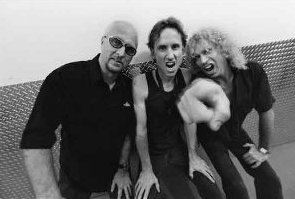
May 2000
Prog
Visions

(Spain)
by
Jaume Pujol PV:
Could you say something about the history of the band? How did
 's
members contact each other? 's
members contact each other?
Clint:
All by chance: Keith while practicing outdoors and the drummer via
an advert.
Keith:
I used to practice outdoors by the Hudson River. Clint heard
me one day and invited me over to jam at his new rehearsal space.
This space quickly became the laboratory where we grew this monster
that calls itself  ,
which chewed up and spat out several drummers until it found Kevin. ,
which chewed up and spat out several drummers until it found Kevin.
How would you describe your music to people who haven't heard it yet?
Keith:
It's rock and roll. It's energy. It's a violent chemical reaction
amongst three strong musical personalities.
Clint:
A challenging mix of genres, but always rock.
It's been labeled
"Millennium Fusion."
What do you want to transmit with your music? Has the band a kind
of internal philosophy?
Keith:
We want to transmit ourselves, our humanity, our sweat, our
tears, our bite.
Clint:
Energy, power, brains and beauty. The band has no boundaries.
How
do you compose your music? Is it a collective work?
Keith:
Lately, we are finding less and less distinction between composing
and arranging. We all compose our own parts, so the end result is
very much a collective effort.
Your
music has multiple influences. Could you give some details? What kind
of music do you listen to normally?
Keith:
Whether it's "jazz," "rock," or "classical" (and I've gone through
phases with each), I respond to the genuine, uncompromised, visionaries:
Charlie Parker, John Coltrane, Richard Wagner, Bach. The
imitated, not the imitators. The pure, not the watered-down.
Clint:
I listen to everything, but I need to hear melody in music.
I listen to Beatles, Bartok, Crimson, Shankar, Sinatra, and
avant jazz. Lyrically, Lennon/ McCartney, Buddy Feyne,
Richard Palmer-James, Pete Townshend and Cole Porter.
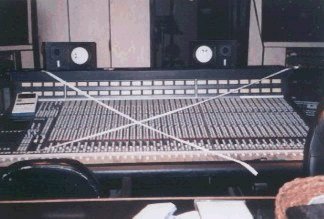
Your CD was produced by Genya Ravan, of Ten Wheel Drive, how did it
happen?
Keith:
Genya heard us recording a live album at CBGBs. She walked up
to the stage and told us we were "the real deal." She understands
music in a visceral way: it's in her blood.
Clint:
She has since become a very good friend. She's great!
Your CD was produced by Genya Ravan, of Ten Wheel Drive, how did it
happen?
Keith:
Genya heard us recording a live album at CBGBs. She walked up
to the stage and told us we were "the real deal." She understands
music in a visceral way: it's in her blood.
Clint:
She has since become a very good friend. She's great!
The music included on your first album has a lot of different progressive
ambiance. How did you get that variety? Was it intentional?
Keith:
The music happens very organically.
If anything, our intention is that it should come into being without
a whole lot of self-consciousness.
Clint: With
dynamics, careful arrangements and a sense of humor.
Currently, you are experimenting a lot with instruments and new structures
and developments of your compositions.
Could you explain more about it? It seems very interesting.
Clint:
The music is getting harder and more
aggressive. Keith has just bought new FX pedals for his woodwinds.
We are also
developing several new instrumental works and I am using 12-string basses
so the sound is huge.
Plans
for the future. I know that you are preparing new compositions and you
will do some gigs. Could you say more about that?
Clint:
Concerts, recording and securing an
international recording deal.
What is progressive
rock to you?
Clint:
Music that pushes the envelope forward, NOT BACKWARD.
Some
words for ProgVisions e-zine visitors?
Clint:
Please take some time to listen
to 
and
check our web site at www.TriPod-theband.com
Our e-mail address is ClintBahr@gmail.com
Keith:
 Rules.
Rules.
Thank
you, Jaume! Keep up the great work with ProgVisions.
All
our best,
Clint
and Keith
|
![]()

